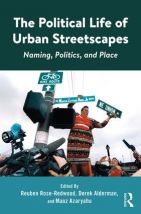The Political Life of Urban Streetscapes: Naming, Politics, and Place

The introduction clearly sets out the purpose of this book: “Drawing upon a wide range of case studies from Europe, North America, Sub-Saharan, Africa, and Asia, the contributions in this volume provide detailed accounts of how the practices of street naming have been instrumental to the reshaping of urban spatial imaginaries, the cultural politics of place, and material struggles over the right to the city” (page 3). The rest of the introduction describes the shift in toponymy studies from the 1920s onward, from a focus on linguistics and cultural significance, to an exploration of how street names, both formal and unofficial, are sites of power and resistance.
Themes across this edited collection include the legacy of colonial and postcolonial naming practices (as in Southeast Asia and South Africa), the use of street naming to stoke nationalism (as in postsocialist Europe), and the way street names intersect with racial, gender, and class identities (as in the identity-conscious US). These chapters make it abundantly clear that urban street naming is often a political process, rather than an innocently commemorative or descriptive exercise.
This is obvious for instance in the case study of Durban, South Africa, where a number of streets were renamed in 2007–2008. As James Duminy summarizes (page 241):
“Those for and against the process contested questions of who or what is worthy of commemoration in Durban; of whose vision of and for post-apartheid South African society is “correct”; of the “real” meanings or intentions hidden in the official process and its associated acts of resistance; and of who or what has legitimate authority over the production of the urban symbolic environment.”
Looking forward, one chapter examines the geo-coding app Makani, now in use in Dubai, which adopts a numbering system rather than street names to identify places. This attempt to rationalize and standardize the way Dubai is navigated fits into a smart-city ethos that is often too unconcerned with power and inequality. Author Maral Sotoudehnia worries about the way that turning locations into code may accentuate social and spatial differences, between relative newcomers and those with a cultural memory of the city, and between the tech-savvy and those less so. Sotoudehnia is also concerned about Makani’s proprietary, closed-source nature, which gives both the software developer and the Dubai government additional power over representations of the city (including its informal areas).
The conclusion notes, while discussing the changing of street names in Toronto to their indigenous roots, that activist toponymy is useful but not sufficient. Highlighting the forgotten or significant (such as victims of police brutality) through street names needs to be part of a larger strategy for reform. Yet when it comes to the symbolic part of this strategy – the daily reminders provoked by spatial designations – street names shouldn’t be overlooked.
Further reading:
Guyot, Sylvain and Cecil Seethal (2007), “Identity of place, places of identities: change of place names in post-apartheid South Africa”, The South African Geographical Journal Vol 89, No 1, pages 55–63, available at https://hal.archives-ouvertes.fr/hal-00201762/document.
Kadmon, Naftali (2004), “Toponymy and geopolitics: the political use — and misuse — of geographical names”, The Cartographic Journal Vol 41, No 2, pages 85–87, available at https://www.iwp.edu/docLib/20131022_KadmonToponomyandGeopolitics.pdf.
Book note prepared by Christine Ro
Search the Book notes database
Our Book notes database contains details and summaries of all the publications included in Book notes since 1993 - with details on how to obtain/download.
Use the search form above, or visit the Book notes landing page for more options and latest content.
For a searchable database for papers in Environment and Urbanization, go to http://eau.sagepub.com/

